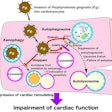Long-term use of photosensitizing antihypertensive drugs increase the risk for lip cancer by two- to fourfold, according to a new study in Archives of Internal Medicine (August 6, 2012).
Researchers from Kaiser Permanente Medical Care Program and Stanford University School of Medicine evaluated prescriptions dispensed for 23,616 non-Hispanic white adults with hypertension from August 1, 1994, to February 29, 2008. They identified 712 patients with lip cancer and 22,904 well-matched controls.
In a previous study, the researchers noted an association between lip cancer and the diuretic hydrochlorothiazide and calcium channel blocker nifedipine (Cancer Causes and Control, December 2009, Vol. 20:10, pp. 1821-1835).
In this latest study, they further characterize the risk of lip cancer associated with these two drugs and several other commonly used antihypertensive agents: the combination of hydrochlorothiazide with the potassium-sparing diuretic triamterene, the angiotensin-converting-enzyme (ACE) inhibitor lisinopril, and the beta-adrenergic blocker atenolol.
The risk of developing lip cancer showed a dose-response relationship with the use of certain antihypertensive drugs, with the risk increasing as the duration of drug use increased, the study authors noted. For patients treated with hydrochlorothiazide for five years or more, the odds ratio (OR) of developing lip cancer was 4.22. The OR for the combination drug hydrochlorothiazide-triamterene was 2.82, and the OR for nifedipine was 2.50. The OR was of borderline significance for lisinopril (1.42).
In contrast, for patients treated with atenolol for five years or more, the risk of developing lip cancer was reduced, with an odds ratio of 0.54, the researchers reported.
"Although the relatively high odds ratios, the evidence for specificity, and the biological mechanism are consistent with a causal relationship, causality cannot usually be established by a single observational study such as ours," they concluded. Further investigations are needed to confirm and characterize relationships between photosensitizing antihypertensive agents and lip cancer, they added.



















